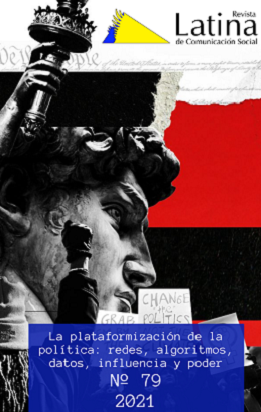La plataformización de la política: redes, algoritmos, datos, influencia y poder | Fecha límite: 31 mayo de 2021
Abstract
The platformization of politics: networks, algorithms, data, influence and power
The links between communication and politics have been, and are, one of the main fields of research in
the Social Sciences. In the last decade, this area has been affected by a strong dynamic of change due to
the impact of social networks. These digital platforms have not only settled in our society, but have also
become indispensable elements for our daily lives, giving rise to the emergence of platformization. This
phenomenon places these media and digital networks, and their infrastructures and logic, as one of the
key agents that lead the transformation of society. Its penetration into different fields and spheres, such
as politics, is contributing to the reorganization of practices and processes on a large scale. In this sense,
data and algorithms are assuming an increasing role in the redefinition of power and political influence.
These media and digital networks, such as Facebook, YouTube, Instagram or WhatsApp among others,
have facilitated new potentialities within political communication (connectivity, interactivity, selfproduction,
horizontality, virality, etc.) while simultaneously introducing new problems and challenges for
democracy (polarization, digital surveillance, fake news, cyber manipulation, fragmentation, abundance,
pseudo-debate, etc.). This disruptive scenario affects the three classic actors of political communication:
media, politicians and citizens. Therefore, it is essential to examine how the practices, activities,
strategies and processes of political communication are being altered by the influence of platformization.
In short, we need to know how these digital technologies influence and transform the role of citizens in
communication, the communication strategies of political actors, the processes of production and
dissemination of political information by journalists and the type of communication that emerges, among
other aspects.
In this sense, this special issue hopes to receive empirical articles (exclusively theoretical or literature
review articles will not be considered) that make contributions and allow an original, relevant and
innovative advance on issues such as the following for illustrative purposes:
- Changes in the dynamics of the production of information and political journalism within the framework
of the platformization of politics.
- New formulas for the circulation and distribution of political information in the scenario of the
platformization of politics.
- New communication models in the context of digital media and networks.
- Political uses of digital platforms by citizens.
- Uses and strategies of social platforms by political actors.
- Changes in the establishment and construction of the public agenda in the framework of social media.
- New relationships between the media and political agendas in the framework of platformization.
- Reconfiguration of political influence within the framework of the platformization of politics.
- Incidence and strategies of political opinion leaders and digital influencers on digital platforms.
- Incidence and consequences of algorithms and big data in political communication, public opinion and
its effects on democracy.
- Impact of algorithms and big data on electoral processes.
Keywords: political communication, algorithms, social networks, big data, democracy, platformization.
Deadline: 31 May 2021
Downloads





